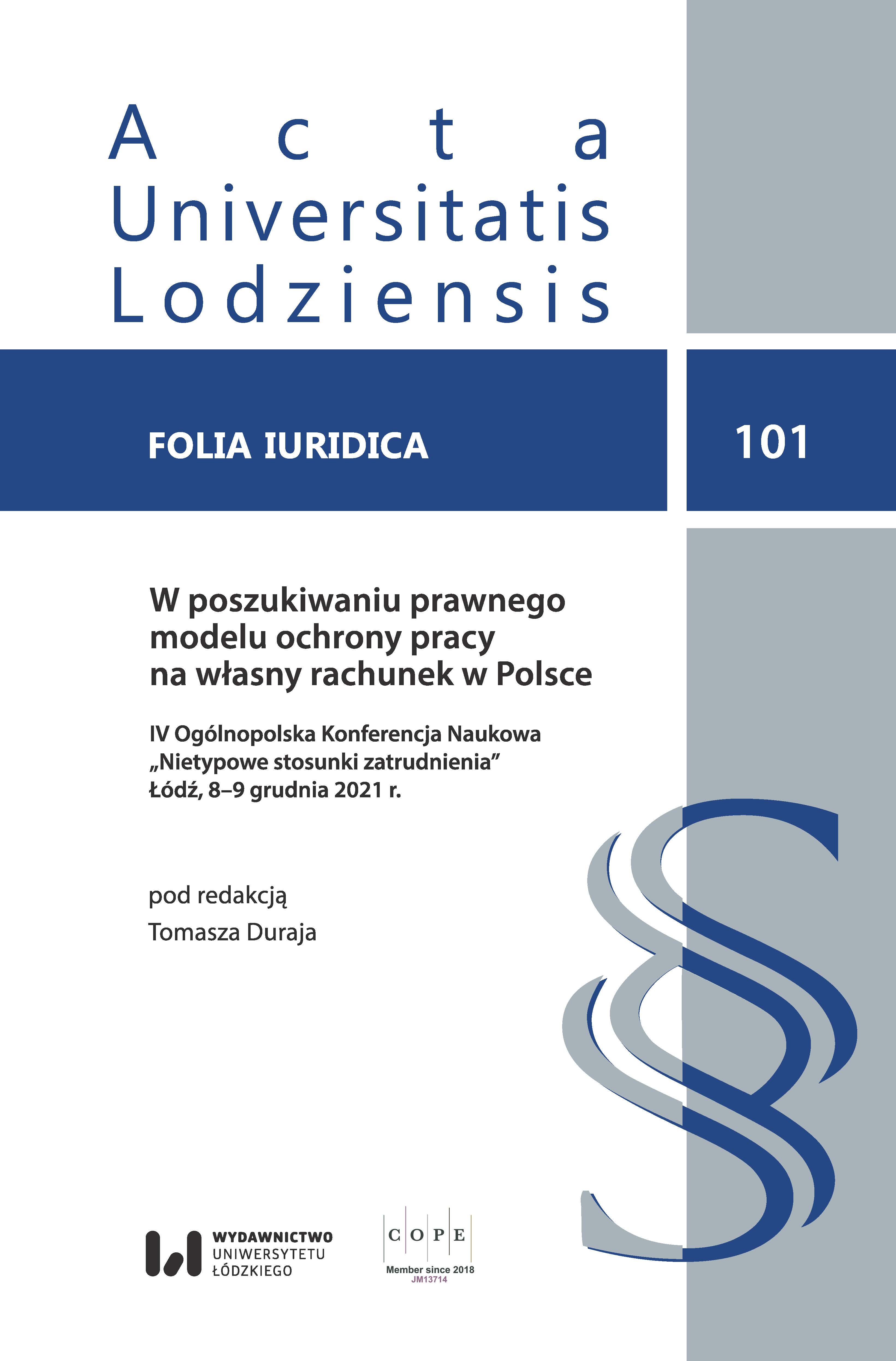Kryterium zależności ekonomicznej, jako przesłanka przyznania niektórych praw pracowniczych samozatrudnionym w Polsce
DOI:
https://doi.org/10.18778/0208-6069.101.09Słowa kluczowe:
pojęcie pracownika, zakres stosowania prawa pracy, praca indywidualna, pracownicy ekonomicznie zależni, osoba prowadząca działalność na własny rachunekAbstrakt
Obecny stan prawny chroniący tylko pracowników w rozumieniu art. 2 Kodeksu pracy oraz w nieznacznej części zleceniobiorców przyczynia się do pogorszenia sytuacji samozatrudnionych półzależnych, wywołując w rezultacie skutki wręcz odwrotne do zamierzonych tj. inkluzji aksjologii funkcji ochronnej na niepracownicze formy świadczenia pracy. Polska nie ma własnego zakresu przepisów ochronnych na wzór przepisów Kodeksu pracy, który miałby zastosowanie do ekonomicznie półzależnych samozatrudnionych. W niniejszym artykule analizowane jest pojęcie typu ekonomicznie półzależnych samozatrudnionych jako przesłanki wyjściowej do przyznania im niektórych praw pracowniczych. Można wyciągnąć dwa główne wnioski: po pierwsze, ekonomicznie półzależni samozatrudnieni nie są kategorią pośrednią między pracownikami a osobami samozatrudnionymi, ale podkategorią osób samozatrudnionych. Po drugie, brak przyznania im ochrony przez polskie prawo pracy będzie mieć negatywny wpływ na rozszerzenie praw zbiorowych samozatrudnionych.
Pobrania
Bibliografia
Adserà, Alícia. Carles Boix. Mark Payne. 2003. “Are You Being Served? Political accountability and quality of government.” The Journal of Law, Economics, and Organization 19(2): 445–490.
Google Scholar
DOI: https://doi.org/10.1093/jleo/ewg017
Brameshuber, Elisabeth. 2019. “The «Personal Work Relationship» in Austria.” European Labour Journal 10(3): 187–197.
Google Scholar
DOI: https://doi.org/10.1177/2031952519865390
Davidov, Guy. 2005. “Who is a Worker?” Industrial Law Journal 34(1): 57–71.
Google Scholar
DOI: https://doi.org/10.1093/ilj/34.1.57
Davies, A.C.L. 2012. EU Labour Law. Cheltenham–Northampton, MA: Edward Elgar.
Google Scholar
Florek, Ludwik. 2015. “Ewolucja kodeksu pracy.” Studia Iuridica Lublinensia 24(3): 29–43.
Google Scholar
DOI: https://doi.org/10.17951/sil.2015.24.3.29
Freedland, Mark. 2010. The Personal Employment Contract. Oxford: Oxford University Press.
Google Scholar
Freedland, Mark. 2019. “New Trade Union Strategies for New Forms of Employment: A brief analytical and normative foreword.” European Labour Law Journal 10(3): 179–182.
Google Scholar
DOI: https://doi.org/10.1177/2031952519865824
Gersdorf, Małgorzata. 1993. “Umowa o pracęa umowa o dzieło i zlecenia.” Praca i Zabezpieczenie Społeczne 9: 50–62.
Google Scholar
Gramano, Elena. Giovanni Gaudio. 2009. “New Trade Union Strategies for New Forms of Employment: Focus on Italy.” European Labour Law Journal 10: 240–253.
Google Scholar
DOI: https://doi.org/10.1177/2031952519870028
Jarota, Maciej. 2015. “Funkcja ochronna prawa pracy na przykładach wybranych regulacji państw europejskich”. Annales Universitatis Mariae Curie-Skłodowska 62: Section G.
Google Scholar
DOI: https://doi.org/10.17951/g.2015.62.2.67
Latos-Miłkowska, Monika. 2013. Ochrona interesu pracodawcy. Warszawa: LexisNexis.
Google Scholar
Liszcz, Teresa. 2017. “Umowa o pracę.” In System Prawa Pracy. Vol. 2: Indywidualne prawo pracy. Część ogólna. 26–27. Ed. by Krzysztof W. Baran, Warszawa: Wolters Kluwer.
Google Scholar
Maciejewski, Sławomir. 2017. “Zasada godziwego wynagrodzenia za pracę jako prawo pracownicze.” In Ochrona praw człowieka w wymiarze uniwersalnym. Aksjologia – instytucje – nowe wyzwania – praktyka. 294–296. Ed. by Jerzy Jaskiernia, Kamil Spryszak, Toruń: Wydawnictwo Adam Marszałek.
Google Scholar
MOP: Ensuring better social protection for self-employed workers 2020, https://www.ilo.org/wcmsp5/groups/public/---dgreports/---ddg_p/documents/publication/wcms_742290.pdf (accessed: 15.07.2022).
Google Scholar
Muehlberger, Ulrike. Silvia Pasqua. 2009. Workers on the Border Between Employment and Self-employment, https://papers.ssrn.com/sol3/papers.cfm?abstract_id=932060 (accessed: 15.07.2022).
Google Scholar
Musiała, Anna. 2011. Zatrudnienie niepracownicze. Warszawa: Difin.
Google Scholar
Mutual Learning Programme, DG Employment, Social Affairs and Inclusion 2020, https://ec.europa.eu/social/main.jsp?catId=1047 (accessed: 15.07.2022).
Google Scholar
Nowak, Monika. 2007. Prawo do godziwego wynagrodzenia za pracę. Regulacja prawna i treść. Łódź: Wydawnictwo Uniwersytetu Łódzkiego.
Google Scholar
Prusinowski, Piotr. 2019. “Prawo do wynagrodzenia.” In Międzynarodowe publiczne prawo pracy. Standardy globalne. 451–474. Ed. by Krzysztof W. Baran. Warszawa: Wolters Kluwer.
Google Scholar
Sobczyk, Arkadiusz. 2014. “Różnicowanie praw (ochrony) zatrudnionych – wybrane kryteria i ich ocena.” In Funkcja ochronna prawa pracy a wyzwania współczesności. Ed. by Maria Bosak, 1, Warszawa: C.H. Beck.
Google Scholar
Świątkowski, Andrzej M. 2011. “Przedmiot stosunku pracy. Rozważania de lege lata i de lege ferenda.” In Współczesne problemy prawa pracy i ubezpieczeń społecznych. XVIII Zjazd Katedr i Zakładów Prawa Pracy i Ubezpieczeń Społecznych. Ed. by Ludwik Florek, Łukasz Pisarczyk. Warszawa: LexisNexis.
Google Scholar
Świątkowski, Andrzej M. 2015. “Prawo pracy II RP: symbioza zatrudnienia pracowniczego i cywilnoprawnego (prolegomena do współczesnego podziału zatrudnienia).” Studia z Dziejów Prawa i Państwa Polskiego 18: 169–191.
Google Scholar
Todolí-Signes, Adrián. 2019. “Workers, the Self-employed and TRADEs: Conceptualisation and collective rights 254 in Spain.” European Labour Law Journal 10(3): 254–270.
Google Scholar
DOI: https://doi.org/10.1177/2031952519867544
Act of November 17, 1964 – Code of Civil Procedure, Journal of Laws 1964 No. 43, item 296.
Google Scholar
Act of June 26, 1974, the Labor Code, Journal of Laws 1974 No. 24, item 141.
Google Scholar
Act of 23 May 1991 on Trade Unions, Journal of Laws 1991 No. 55, item 234 as amended.
Google Scholar
Pobrania
Opublikowane
Jak cytować
Numer
Dział
Licencja

Utwór dostępny jest na licencji Creative Commons Uznanie autorstwa – Użycie niekomercyjne – Bez utworów zależnych 4.0 Międzynarodowe.














